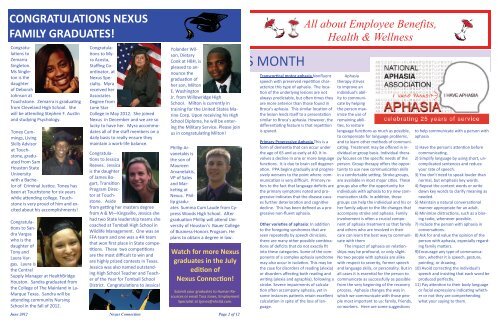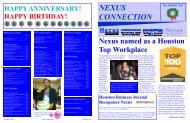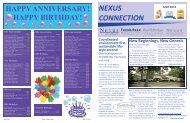nexus connection june 2012 - Touchstone Neurorecovery Center
nexus connection june 2012 - Touchstone Neurorecovery Center
nexus connection june 2012 - Touchstone Neurorecovery Center
Create successful ePaper yourself
Turn your PDF publications into a flip-book with our unique Google optimized e-Paper software.
CONGRATULATIONS NEXUS<br />
FAMILY GRADUATES!<br />
Congratula�ons<br />
to<br />
Zemarra<br />
Singleton.<br />
Ms Singleton<br />
is the<br />
daughter<br />
of Deborah<br />
Johnson at<br />
<strong>Touchstone</strong>. Zemarra is gradua�ng<br />
from Cleveland High School. She<br />
will be a�ending Stephen F. Aus�n<br />
and studying Psychology.<br />
Toney Cummings,<br />
Living<br />
Skills Advisor<br />
at <strong>Touchstone</strong>,graduated<br />
from Sam<br />
Houston State<br />
University<br />
with a Bachelor<br />
of Criminal Jus�ce. Toney has<br />
been at <strong>Touchstone</strong> for six years<br />
while a�ending college. <strong>Touchstone</strong><br />
is very proud of him and excited<br />
about his accomplishments!<br />
Congratula-<br />
�ons to Sandra<br />
Vargas<br />
who is the<br />
daughter of<br />
Tony and<br />
Laura Vargas.<br />
Laura is<br />
the Central<br />
Supply Manager at HealthBridge<br />
Houston. Sandra graduated from<br />
the College of The Mainland in La-<br />
Marque Texas. Sandra will be<br />
a�ending community Nursing<br />
School in the fall of <strong>2012</strong>.<br />
Congratula-<br />
�ons to Myra<br />
Acosta,<br />
Staffing Coordinator,<br />
at<br />
Nexus Specialty.<br />
Myra<br />
received her<br />
Associates<br />
Degree from<br />
Lone Star<br />
College in May <strong>2012</strong>. She joined<br />
Nexus in December and we are so<br />
lucky to have her. Myra accommodates<br />
all of the staff members on a<br />
daily basis to really ensure they<br />
maintain a work-life balance.<br />
Congratula-<br />
�ons to Jessica<br />
Reeves. Jessica<br />
is the daughter<br />
of James Bogart,<br />
Transi�on<br />
Program Director<br />
at <strong>Touchstone</strong>.<br />
Aside<br />
from ge�ng her masters degree<br />
from A & M—Kingsville, Jessica she<br />
had two State leadership teams she<br />
coached at Tomball High School in<br />
Wildlife Management. One was an<br />
FFA team and one was a 4H team<br />
that won first place in State compe-<br />
��ons. These two compe��ons<br />
are the most difficult to win and<br />
are highly prized contests in Texas.<br />
Jessica was also named outstanding<br />
High School Teacher and Teacher<br />
of the Year for Tomball School<br />
District. Congratula�ons to Jessica!<br />
Yolander Wilson,<br />
Dietary<br />
Cook at HBH, is<br />
pleased to announce<br />
the<br />
gradua�on of<br />
her son, Milton<br />
E. Washington<br />
Jr. from Willowridge High<br />
School. Milton is currently in<br />
training for the United States Marine<br />
Corp. Upon receiving his High<br />
School Diploma, he will be entering<br />
the Military Service. Please join<br />
us in congratula�ng Milton!<br />
Phillip Arvanetakis<br />
is<br />
the son of<br />
Maureen<br />
Arvanetakis,<br />
VP of Sales<br />
and Marke�ng<br />
at<br />
Nexus. Phillipgraduates<br />
Summa Cum Laude from Cypress<br />
Woods High School. A�er<br />
gradua�on Phillip will a�end University<br />
of Houston’s Bauer College<br />
of Business-Honors Program. He<br />
plans to obtain a degree in law.<br />
Watch for more Nexus<br />
graduates in the July<br />
edi�on of<br />
Nexus Connec�on!<br />
Submit your graduates to Human Resources<br />
or email Tara Jones, Employment<br />
Specialist at tjones@nhsltd.com.<br />
June <strong>2012</strong> Nexus Connection Page 2 of 12<br />
S MONTH<br />
Transcor�cal motor aphasia Nonfluent<br />
speech with preserved repe��on characterize<br />
this type of aphasia. The loca-<br />
�on of the underlying lesions are not<br />
always predictable, but o�en �mes they<br />
are more anterior than those found in<br />
Broca’s aphasia. This similar loca�on of<br />
the lesion lends itself to a presenta�on<br />
similar to Broca’s aphasia. However, the<br />
differen�a�ng feature is that repe��on<br />
is spared.<br />
Primary Progressive Aphasia This is a<br />
form of demen�a that can occur under<br />
the age of 65 and as early at 40. It involves<br />
a decline in one or more language<br />
func�ons. It is due to brain cell degenera�on.<br />
PPA begins gradually and progressively<br />
worsens to the point where communica�on<br />
is very difficult. Primary refers<br />
to the fact that language deficits are<br />
the primary symptoms noted and progressive<br />
indicates that the disease causes<br />
further deteriora�on and cogni�ve<br />
decline. This has been defined as a progressive<br />
non-fluent aphasia.<br />
Other varie�es of aphasia: In addi�on<br />
to the foregoing syndromes that are<br />
seen repeatedly by speech clinicians,<br />
there are many other possible combina-<br />
�ons of deficits that do not exactly fit<br />
into these categories. Some of the components<br />
of a complex aphasia syndrome<br />
may also occur in isola�on. This may be<br />
the case for disorders of reading (alexia)<br />
or disorders affec�ng both reading and<br />
wri�ng (alexia and agraphia), following a<br />
stroke. Severe impairments of calcula-<br />
�on o�en accompany aphasia, yet in<br />
some instances pa�ents retain excellent<br />
calcula�on in spite of the loss of language.<br />
All about Employee Benefits,<br />
Health & Wellness<br />
Aphasia<br />
therapy strives<br />
to improve an<br />
individual's ability<br />
to communicate<br />
by helping<br />
the person maximize<br />
the use of<br />
remaining abili-<br />
�es, to restore<br />
language func�ons as much as possible,<br />
to compensate for language problems,<br />
and to learn other methods of communica�ng.<br />
Treatment may be offered in individual<br />
or group basis. Individual therapy<br />
focuses on the specific needs of the<br />
person. Group therapy offers the opportunity<br />
to use new communica�on skills<br />
in a comfortable se�ng. Stroke groups,<br />
are available in most major ci�es. These<br />
groups also offer the opportunity for<br />
individuals with aphasia to try new communica�on<br />
skills. In addi�on, these<br />
groups can help the individual and his or<br />
her family adjust to the life changes that<br />
accompany stroke and aphasia. Family<br />
involvement is o�en a crucial component<br />
of aphasia treatment so that family<br />
and others who are involved in their<br />
care can learn the best way to communicate<br />
with them<br />
The impact of aphasia on rela�onships<br />
may be profound, or only slight.<br />
No two people with aphasia are alike<br />
with respect to severity, former speech<br />
and language skills, or personality. But in<br />
all cases it is essen�al for the person to<br />
communicate as successfully as possible<br />
from the very beginning of the recovery<br />
process. Aphasia changes the way in<br />
which we communicate with those people<br />
most important to us: family, friends,<br />
co-workers. Here are some sugges�ons<br />
to help communicate with a person with<br />
aphasia<br />
1) Have the person's a�en�on before<br />
communica�ng.<br />
2) Simplify language by using short, uncomplicated<br />
sentences and reduce<br />
your rate of speech.<br />
3) You don't need to speak louder than<br />
normal, but emphasis key words.<br />
4) Repeat the content words or write<br />
down key words to clarify meaning as<br />
needed.<br />
5) Maintain a natural conversa�onal<br />
manner appropriate for an adult.<br />
6) Minimize distrac�ons, such as a blaring<br />
radio, whenever possible.<br />
7) Include the person with aphasia in<br />
conversa�ons.<br />
8) Ask for and value the opinion of the<br />
person with aphasia, especially regarding<br />
family ma�ers.<br />
9)Encourage any type of communica-<br />
�on, whether it is speech, gesture,<br />
poin�ng, or drawing.<br />
10) Avoid correc�ng the individual's<br />
speech and insis�ng that each word be<br />
produced perfectly.<br />
11) Pay a�en�on to their body language<br />
or facial expressions indica�ng whether<br />
or not they are comprehending<br />
what your saying to them.





